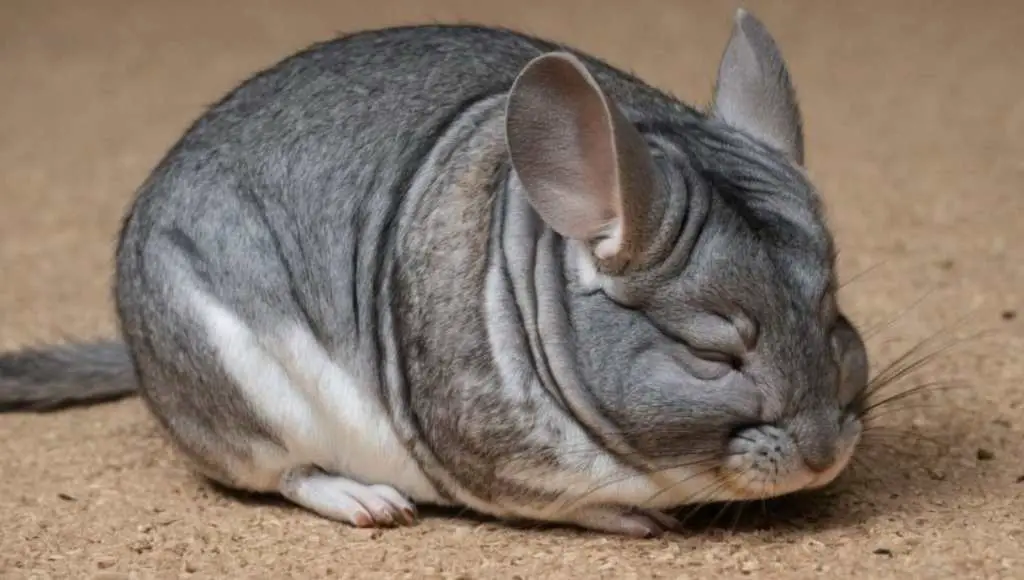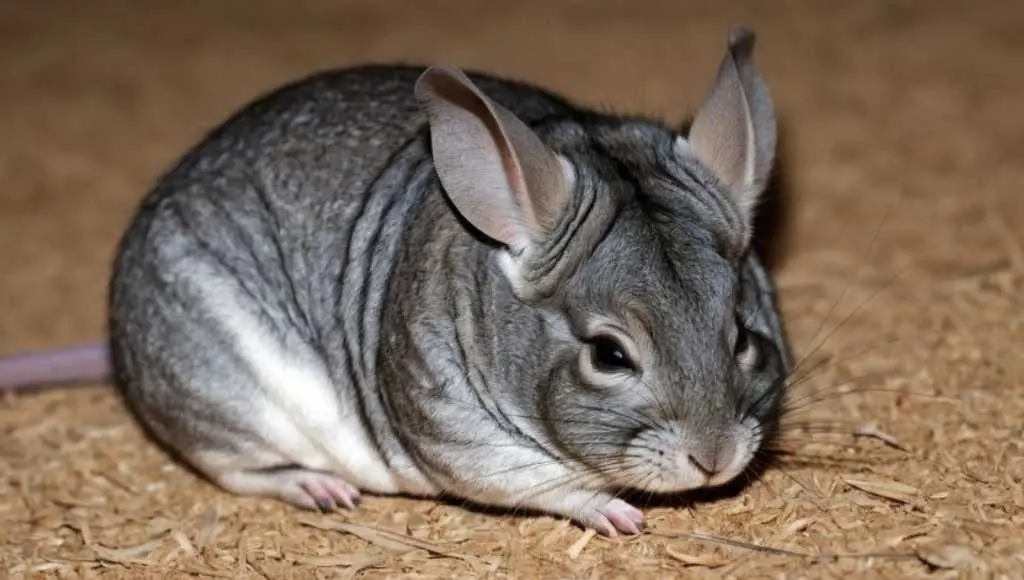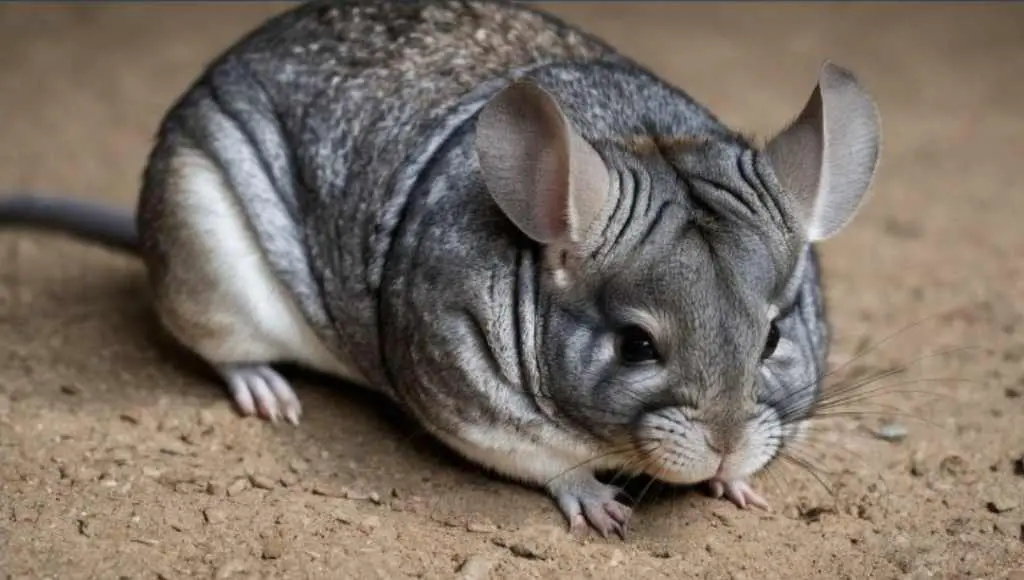12 Most Common Chinchilla Dying Symptoms With Tips

Today, let’s talk about something important: chinchilla dying symptoms.
As pet owners, it’s crucial to be aware of the signs that indicate our furry friends might be unwell.
In this article, we’ll explore some key chinchilla dying symptoms you should never ignore.
So, let’s dive in and keep our chinchillas happy and healthy!
Chinchilla Dying Symptoms
Chinchilla dying symptoms include loss of appetite, reduced feces production, respiratory infections, and mobility problems.
If you notice any of these signs, it’s important to take your chinchilla to a veterinarian for proper diagnosis and treatment.
Additionally, maintaining a healthy diet, a clean environment and regular health checks can help ensure the well-being of your chinchilla.
While it can be difficult to witness these symptoms, being aware of them will allow you to provide the best possible care for your pet.
Let’s break it down further…
Here are some common chinchilla dying symptoms:
1. Behavioral changes

One of the signs that a chinchilla may be nearing the end of its life is a noticeable change in its behavior.
Normally active and curious chinchillas may become lethargic and lose interest in their surroundings.
They may spend more time sleeping and show a decrease in appetite.
If you notice your chinchilla becoming unusually withdrawn or uninterested in activities it used to enjoy, it could be a sign that something is wrong.
2. Uncontrolled seizures or tremors
Seizures or tremors in a chinchilla can be a distressing symptom to witness.
If your chinchilla starts experiencing sudden and uncontrolled shaking or convulsions, it is important to seek veterinary attention as soon as possible.
Seizures can be caused by various underlying health issues, and they can indicate a serious condition that requires immediate medical intervention.
3. Loss of balance or coordination
Chinchillas are known for their agility and nimbleness, so if you notice your chinchilla struggling with balance or coordination, it could be a sign of a deteriorating health condition.
A chinchilla nearing the end of its life may have difficulty maintaining its balance, resulting in wobbling or stumbling while moving.
Loss of coordination can also manifest as difficulty climbing or jumping, which are activities chinchillas normally excel at.
4. Unresponsiveness to stimulation
Chinchillas are generally curious and responsive to their environment.
However, when a chinchilla is close to passing away, it may become unresponsive to stimulation.
This means that they may not react to external stimuli, such as sounds or movements, as they would normally do. They may appear dazed or unaware of their surroundings.
It’s important to note that while unresponsiveness can be a sign of a chinchilla nearing the end of its life, it can also indicate other serious health issues that require immediate veterinary attention.
5. Fur loss or dull coat
Oh no, it’s always a cause for concern when your chinchilla starts experiencing fur loss or has a dull coat.
Chinchillas are known for their beautiful, soft fur, so any changes in its appearance can be a sign that something is not right.
Fur loss can occur due to various reasons such as stress, malnutrition, skin infections, or underlying health issues.
It’s important to keep an eye on your chinchilla’s fur and consult a veterinarian if you notice any significant changes.
They’ll be able to provide you with guidance and help determine the underlying cause.
6. Abnormal posture
When it comes to your chinchilla’s posture, it’s essential to pay attention to any unusual or abnormal positions.
Chinchillas typically have an upright and alert posture, so if you observe your furry friend hunched over, lying down all the time, or having difficulty in maintaining balance, it could indicate an underlying health problem.
It’s best to seek veterinary assistance promptly to diagnose the cause of this abnormal posture and provide appropriate treatment.
7. Eye or nose discharge
If you notice any eye or nose discharge in your chinchilla, it’s crucial not to ignore it.
Discharge from the eyes or nose can be a sign of respiratory infection, allergies, or even dental issues.
Keep an eye out for any abnormal color, consistency, or excessive discharge.
It’s advisable to consult a veterinarian who specializes in exotic pets to examine your chinchilla and determine the underlying cause.
Prompt medical attention can help prevent further complications and ensure your chinchilla receives the care it needs.
8. Excessive thirst or urination
Changes in your chinchilla’s drinking and urination habits can be indicators of an underlying health problem.
If you notice that your chinchilla is drinking water excessively or urinating more frequently than usual, it’s important to take note of it.
These symptoms could be related to issues such as kidney problems, bladder infections, or diabetes.
Consulting a veterinarian experienced in chinchilla care is crucial for a proper diagnosis and to establish an appropriate treatment plan.
9. Continuous decrease in appetite
When it comes to chinchillas, their love for food is well-known.
So, if you’ve noticed a continuous decrease in your chinchilla’s appetite, it can be a cause for concern.
Loss of appetite can be an indication that something isn’t right.
It’s important to monitor their eating habits closely as chinchillas need a well-balanced diet to stay healthy.
If your chinchilla is not eating as much as usual or refusing to eat altogether, it’s definitely worth seeking veterinary advice.
Learn more about why your chinchilla might not be eating.
10. Rapid weight loss
Another symptom that can be worrying is rapid weight loss in your chinchilla.
Chinchillas are naturally small animals, and any significant decrease in weight can be a cause for concern.
Weight loss may occur due to various reasons such as illness, dental issues, digestive problems, or even stress.
It’s important to keep an eye on your chinchilla’s weight by regularly weighing them or noticing changes in their body shape.
If you notice a sudden and significant drop in weight, it’s crucial to consult a veterinarian promptly.
11. Labored breathing
Labored breathing is another symptom that should never be ignored.
If you observe your chinchilla struggling to breathe, making unusual noises while breathing, or showing signs of respiratory distress, it could be indicative of an underlying health issue.
Respiratory problems in chinchillas can range from infections to allergies and can quickly become serious if left untreated.
Seeking immediate veterinary attention is essential to ensure your chinchilla receives the necessary care.
12. Change in fecal output
Changes in your chinchilla’s fecal output can also provide valuable insight into their health.
Chinchillas generally produce small, dry, and pellet-like feces.
If you notice a sudden change in the size, consistency, or color of their droppings, it could indicate an issue.
Diarrhea, fewer droppings than usual, or the presence of mucus or blood in the stool may be signs of digestive problems, dietary issues, or even parasites.
It’s crucial to keep an eye on your chinchilla’s fecal output and consult with a veterinarian if you notice any abnormal changes.
Learn more about identifying a sick chinchilla.
How to care for a dying chinchilla
Caring for a dying Chinchilla at home requires compassion and attention to their specific needs.
Firstly, ensure a quiet and comfortable space for your Chinchilla, away from excessive noise and activity.
Provide soft bedding and gentle lighting to create a soothing environment.
Offer small, frequent meals of easily digestible food, such as pellets or hay.
Hydration is crucial, so regularly offer water through a shallow dish or a syringe if necessary.
Administer any prescribed medications carefully, following the veterinarian’s instructions.
Lastly, provide emotional support by spending quiet, quality time with your Chinchilla, offering gentle strokes and reassuring words.
What do chinchillas usually die from
Chinchillas can face a variety of health issues that may contribute to their lifespan.
Common causes of death in chinchillas include respiratory infections, gastrointestinal issues, heatstroke, and heart conditions.
Dental problems can also lead to difficulty eating and weight loss, while respiratory infections can cause breathing difficulties and pneumonia.
Gastrointestinal issues like bloat or blockages can be fatal if not treated promptly.
Chinchillas are sensitive to heat and can suffer from heatstroke, which can be deadly.
Lastly, heart conditions, such as heart failure, can lead to sudden death. Regular veterinary check-ups and a healthy diet can help prevent and address these issues.
How to comfort a dying chinchilla

When it comes to comforting a dying chinchilla, it’s important to approach the situation with compassion and sensitivity.
First, create a peaceful environment by keeping the chinchilla in a quiet and comfortable space. Provide soft bedding and ensure the temperature is appropriate.
Offer gentle physical contact, such as stroking or holding the chinchilla, if it seems open to it.
Keep the chinchilla hydrated by offering small sips of water or providing a shallow dish nearby.
Lastly, speak softly and soothingly to the chinchilla, offering words of comfort and reassurance.
Remember, your presence and kindness can bring solace to a chinchilla in its final moments.
How to get over the death of your chinchilla
Losing a beloved pet can be a heartbreaking experience, and the death of a chinchilla is no exception.
Here are some steps to help you navigate through the grieving process and find solace in fond memories.
Firstly, allow yourself to mourn. It’s natural to feel sadness and grief, so give yourself permission to express these emotions.
Secondly, seek support from loved ones or join online communities of fellow chinchilla owners who can empathize with your loss.
Sharing your feelings can provide comfort and understanding. Thirdly, create a memorial or tribute to honor your chinchilla’s memory.
This could be a photo album, a personalized keepsake, or planting a tree in their honor.
Next, focus on self-care. Take time to engage in activities that bring you joy and peace.
Whether it’s going for walks, practicing mindfulness, or pursuing a hobby, prioritize self-nurturing.
Additionally, consider volunteering or donating to an animal-related cause in your chinchilla’s name.
This can help channel your grief into something positive. Finally, remember that healing takes time.
Be patient with yourself and allow the memories of your chinchilla to bring you comfort rather than pain.
FAQs
What are some common signs that my chinchilla is dying?
Common signs that your chinchilla may be nearing the end of its life include lethargy, loss of appetite, difficulty breathing, hunched posture, and a lack of interest in its surroundings.
Are there any specific symptoms I should look out for?
Yes, there are a few specific symptoms that could indicate a serious health issue in your chinchilla. These include sudden weight loss, diarrhea, excessive drooling, seizures, and bleeding from any part of the body.
Is it normal for my chinchilla to become less active as it gets older?
Yes, as chinchillas age, they naturally become less active. However, if your chinchilla’s activity level suddenly decreases significantly, it could be a sign of illness or distress.
How can I tell if my chinchilla is in pain?
Chinchillas are known to hide their pain, but there are a few subtle signs you can look out for. These include teeth grinding, excessive grooming or scratching, changes in posture, and a reluctance to move or be handled.
Can stress or environmental factors contribute to my chinchilla’s declining health?
Yes, stress and environmental factors can play a role in a chinchilla’s overall health. Sudden changes in their surroundings, such as temperature fluctuations or exposure to loud noises, can lead to stress and potentially impact their well-being.
What should I do if I suspect my chinchilla is dying?
If you believe your chinchilla is nearing the end of its life, it’s important to consult with a veterinarian who specializes in exotic pets. They can provide guidance on how to make your chinchilla as comfortable as possible and help you make informed decisions regarding their care.
Conclusion
In conclusion, recognizing the symptoms of a dying chinchilla is crucial for pet owners. By staying vigilant and observant, we can provide our furry friends with the care they need during their final moments. Remember, early detection and prompt veterinary attention can make a world of difference in their comfort and well-being.
